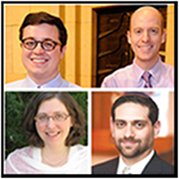 In the past 18 months or so we’ve seen the exciting addition of several new rabbis to the Twin Cities Conservative Jewish Community. Some of these new rabbis are: Rabbi Adam Titcher and Rabbi Aaron Weininger both at Adath Jeshurun, Rabbi Jeremy Fine at Temple of Aaron, and Rabbi Emma Kippley-Ogman at Beth Jacob. Hosted by Rabbi Alexander Davis and Rabbi Avi Olitzky of Beth El Synagogue, the idea is to gather some of this new energy into a room and create a fluid and open discussion to showcase the new blood and ruach in the community with the local Conservative rabbinate. All of that through the lens of one of the most intriguing and esoteric passages in the entire Talmud. Therefore, “Four Rabbis Enter an Orchard” was conceived.
In the past 18 months or so we’ve seen the exciting addition of several new rabbis to the Twin Cities Conservative Jewish Community. Some of these new rabbis are: Rabbi Adam Titcher and Rabbi Aaron Weininger both at Adath Jeshurun, Rabbi Jeremy Fine at Temple of Aaron, and Rabbi Emma Kippley-Ogman at Beth Jacob. Hosted by Rabbi Alexander Davis and Rabbi Avi Olitzky of Beth El Synagogue, the idea is to gather some of this new energy into a room and create a fluid and open discussion to showcase the new blood and ruach in the community with the local Conservative rabbinate. All of that through the lens of one of the most intriguing and esoteric passages in the entire Talmud. Therefore, “Four Rabbis Enter an Orchard” was conceived.
The evening will be an intimate atmosphere of teaching, learning, motivation and thought provoking conversation. It is a wonderful opportunity to hear from the local rabbis, including those “across the river,” in this setting, sharing their theology and philosophy.
The venue, Beth El Synagogue’s new Learning Center, also promotes the ideology of continuing education. This new 2800 square foot, state of the art, beautifully appointed space, built as an extension to the front of the synagogue, provides a space where congregants and community can gather for lectures, study groups, or simply read a book. The goal of the Learning Center is to encourage continual learning and study.
In the spirit of such learning, it is a perfect time of year to revisit the story of Hanukkah—a time when we recall the miracle of the oil and the military victory. But what is behind the Maccabean revolt? Not only did the Philistines defile the Temple, they forbade the study of Torah. Indeed, they burned Torah scrolls and those who studied. We read in the Book of Maccabees: “When they had rent the Books of the Law in pieces, they burned them with fire. And whoever was found with any of the books or if any consented to the Law, the king’s commandment was that they should be put to death” (1 Maccabees 1:56-57).
This, according to folklore, is the origin of Hanukkah dreidels. When Greek soldiers approached school, Jewish children began playing with their tops. They thus hid their learning and tricked the soldiers. Although the legend originates in 19th century Europe (2000 years after the time of the Maccabees!), it expresses the bravery and defiance of the Maccabees, their willingness to risk their lives for Torah, and the centrality of Jewish learning for Jewish continuity.
 Not surprisingly, the primary symbol of the holiday speaks to the important of education. In many cultures, light symbolizes knowledge and learning. Torah is described as a light. This well-known metaphor helps us answer a classic question about Hanukkah: since there was enough oil to last one day, what was the miracle of the first night? Shouldn’t we start lighting the hanukkiyah only on the second night?
Not surprisingly, the primary symbol of the holiday speaks to the important of education. In many cultures, light symbolizes knowledge and learning. Torah is described as a light. This well-known metaphor helps us answer a classic question about Hanukkah: since there was enough oil to last one day, what was the miracle of the first night? Shouldn’t we start lighting the hanukkiyah only on the second night?
The first candle symbolizes the light of Torah that was rekindled by the Maccabees. Just as they rededicated the Temple (“hanukkah” means “rededication”), so did they rededicate their commitment and redouble their efforts to study (“hinnukh” means “education”).
Whereas Haman sought to destroy the Jewish people physically, King Antiochus struck right at the soul of the people. Forbidding Torah study (as well as circumcision, Shabbat celebration, Temple worship, etc.) was an attack on the very foundation of Judaism. Without Torah, Antiochus could destroy the people from the inside out.
Unfortunately, this is a story that has been repeated throughout our history. The Romans, Crusaders, Nazis burned our Torah for they understood what we say each night in our evening service: “ki hem hayeinu v’orekh yameinu, learning is our life and length of our days.”
New learning should be the mission for all of us. In that “light,” please join us as we continue down the learning path to enjoy “Four Rabbis Enter an Orchard” on Monday evening, December 3rd, 7:00 – 9:00 pm in the Learning Center at Beth El Synagogue, 5224 W. 26th Street, St. Louis Park, MN 55416.
This guest post was written by Beth El Marketing Director Kelly Velander.
(Image: Muffet)

